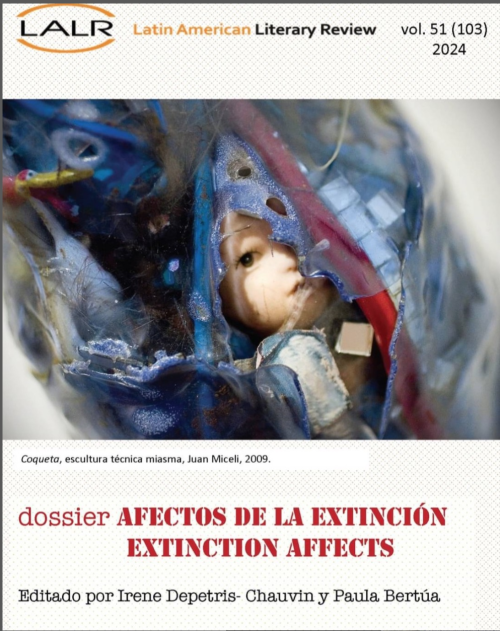Greenleaf Scholar-In-Residence Irene Depetris Chauvin, coordinated the special issue “Extinction Affects in Latin American Literature and Culture” at The Latin American Literary Review.
Written by Irene Depetris Chauvin
Greenleaf Scholar-In-Residence Irene Depetris Chauvin, has curated and published a special bilingual issue titled “Afectos de la extinción en la literatura y la cultura latinoamericana / Extinction Affects in Latin American Literature and Culture” for the Latin American Literary Review.

The dossier, co-edited with Paula Bertúa (Fellow at LIAS, Culture and Society, Leuphana University, Germany) and Fernando Rosenberg (Brandeis University, US), aims to build a bridge between the “Affective Turn” and the “Environmental Humanities.” Its purpose is to deconstruct the nature/culture divide and explore new temporalities and ways of inhabiting the present by acknowledging the materialities, affects, and perceptions evoked by artistic works.
The concept of “extinction” conjures temporal imaginaries of various endings—of history, humanity, nature, or truth—and speculates on the worlds that may emerge. These narratives disrupt or desynchronize human temporal experience, offering alternative alignments that allow for the imagining and creation of affective zones, regions, and territories where contradictions and tensions come to the fore. In other words, they invite alternative ways of being in the world—forms that are hospitable, expansive, and affect-driven, rather than essentialist.
Ecological devastation and species extinction are often accompanied by an “affective repertoire” that includes emotions like sadness, anxiety, anger, compassion, and empathy for lost beings and worlds. However, challenging the prevailing pessimism of some ecological movements, Nicole Seymour (2018) highlights a dissident tradition in artistic expressions that employs irony, estrangement, and even joy to address ecological crises. This perspective shifts the focus from mourning and melancholy to resilience and transformation, as reflected in Emanuele Coccia’s (2021) exploration of life’s metamorphoses, Donna Haraway’s (2020) emphasis on symbiosis and sympoiesis, and Indigenous perspectives from Ailton Krenak (2021) and Davi Kopenawa (2024) that prioritize solidarity between humans and non-humans. These approaches encourage revisiting extinction imaginaries through the lens of non-normative affects. As Kyle Bladow and Jennifer Ladino (2018) argue, affect is inherently ecological, operating at the intersection of texts, environments, and bodies—human, nonhuman, and inanimate. This makes the current theoretical convergence of affect theory, new materialisms, and critical posthumanism a timely framework for addressing today’s ecological and civilizational crises without reinforcing binary divisions between nature/culture or human/nonhuman.
The articles in this dossier examine Latin American aesthetic practices that reimagine how we perceive and act on the planetary emergency. Through a variety of artistic disciplines, including literature, film, photography, performance, and visual arts, the contributors explore diverse dimensions of the crisis. These include notions of temporality (futurity, apocalypse, extinction, and survival), multispecies entanglements and shelters, animal, mineral, botanical, and technical imaginaries, and collaborative survival as forms of re-existence. The studies also delve into Indigenous perspectives on pain, trauma, and intergenerational affects, as well as emergent aesthetics envisioning “worlds to come.”
Access the full dossier and read Dr. Depetris Chauvin introduction here.
